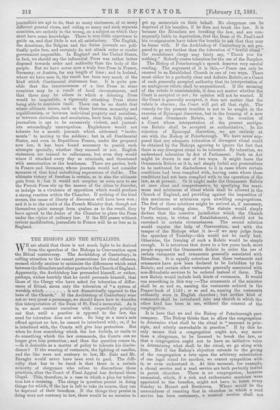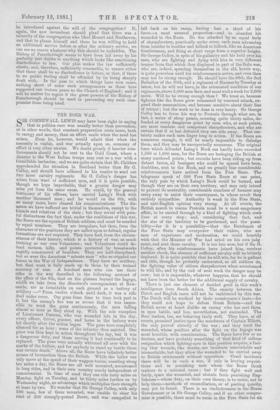THE BISHOPS AND THE RITUALISTS.
WE are afraid that there is not much light to be derived from the speeches of the Bishops in Convocation upon the Ritual controversy. The Archbishop of Canterbury, in calling attention to the recent prosecutions for ritual offences, seemed chiefly anxious to minimise the differences which exist between the Ritualists and other parties in the Church of England. Apparently, the Archbishop has persuaded himself, or rather, perhaps, wishes heartily that he could persuade himself, that those of the Clergy who have asked for toleration of differ- ences of Ritual, mean only the toleration of " a system of
worship which is not diametrically opposed to the laws of the Church," If the Archbishop of Canterbury were not so very great a personage, we should know how to describe this interpretation of the Dean of St. Paul's memorial, As it is, we must content ourselves with respectfully pointing out that, until a practice is opposed to the law, the need for toleration does not arise. So long as a man's acts offend against no law, he cannot be interfered with; or, if he is interfered with, the Courts will give him protection. But when he does something which the law forbids, or omits to do something which the law commands, the Courts can no longer give him protection ; and then the question comes in, —Is it desirable as a matter of policy to tolerate his disobe- dience ? If the wearing of vestments, the lighting of candles, and the like were not contrary to law, Mr. Dale and Mr. Enraght would never have been sent to gaol. The diffi- culty that has to be faced is that there is a certain minority of clergymen who refuse to discontinue these practices, after the Court of Final Appeal has declared them illegal. This, therefore, is a case in which a plea for tolera- tion has a meaning. The clergy in question persist in doing things for which, if the law is left to take its course, they can be deprived of their benefices. If the things they persist in doing were not contrary to law, there would be no occasion to get up memorials on their behalf. No clergyman can be deprived of his benefice, if he does not break the law, It is because the Ritualists are breaking the law, and are con- sequently liable to deprivation, that the Dean of St. Paul's and his co-signatories have taken the trouble to ask that they may be borne with. If the Archbishop of Canterbury is not pre- pared to go any further than the toleration of " lawful ritual " the recalcitrant clergy may fairly say, " Thank you for nothing." Nobody craves toleration for the use of the Surplice.
The Bishop of Peterborough's speech deserves very careful reading. The argument of it is this,—' Peace can only be ensured to an Established Church in one of two ways. There must either be a perfectly clear and definite Rubric, or a Court of such generally accepted authority that its interpretation of an ambiguous rubric shall be unquestioned. If the meaning of the rubric is unmistakable, it does not matter whether the Court is accepted or not ; its opinion will not be wanted. If the Court is generally accepted, it does not matter that the rubric is obscure ; the Court will put all that right. The remedy for the present troubles is not to be sought in the exercise of Episcopal discretion, but in the framing of a new and clear Ornaments Rubric, or in the creation of a Court whose interpretation of the present ambigu- ous Rubric shall be accepted as authoritative.' In his rejection of Episcopal discretion, we are entirely at one with the Bishop of Peterborough. We have never sup- posed that any adequate toleration of divergent ritual could be obtained by the Bishops agreeing to ignore the fact that there is any divergent ritual to be tolerated. By toleration, we understand toleration by Act of Parliament. Such an Act might be drawn in one of two ways. It might leave the Ornaments Rubric as it is, and simply forbid any prosecutions to be instituted for disobedience to it in cases where certain conditions had been complied with, leaving cases where these conditions had not been complied with to the operation of the law, as at present. Or it might make the Ornaments Rubric at once clear and comprehensive, by specifying the maxi- mum and minimum of ritual which shall be allowed in the Church of England, and providing against the imposition of this maximum or minimum upon unwilling congregations. The first of these solutions might be arrived at, if necessary,
by Parliament acting alone. The statute would simply declare that the coercive jurisdiction which the Church Courts enjoy, in virtue of Establishment, should not be exercised in certain circumstances. The second solution would require the help of Convocation, and with the temper of the Bishops what it is—if we may judge from the speeches of Tuesday—this would not be easily had. Otherwise, the framing of such a Rubric would be simple enough. It is notorious that down to a few years back, most people supposed the Ornaments Rubric to order the use of certain vestments and ornaments generally associated with Ritualism. It is equally notorious that these vestments and ornaments have now been declared to be forbidden by the Rubric, and certain other vestments generally associated with non-Ritualistic services to be ordered instead of them. The new Rubric would include both kinds of vestments. It would run something in this way :—The ornaments of the minister shall be so and so, naming the vestments ordered in the Prayer-book of 1549 ; or so and so, naming the vestments ordinarily worn in English churches ; but neither kind of vestments shall be introduced into any church in which the other kind has been in use, without the consent of the congregation.
It is here that we and the Bishop of Peterborough part company. The Bishop thinks that to allow the congregation to determine what shall be the ritual is " unsound in prin- ciple, and utterly unworkable in practice." If by this he only means that a congregation ought not, any more than a clergyman, to be licensed to break the law, or that a congregation ought not to have an initiative voice in determining what shall be the ritual, we go along with him. But if the Bishop's objection extends to the giving of the congregation a veto upon the arbitrary substitution of one legal ritual for another, we cannot sympathise with it, or even understand it. At this moment, for example, a choral service and a read service are both perfectly lawful in parish churches. There is no congregation, however unmusical, which, if a rich and enthusiastic musician were appointed to the benefice, might not have to listen every Sunday to Mozart and Beethoven. Where would be the unsoundness of enacting that in churches in which a read. service has been customary, a musical service shall not be introduced against the will of the congregation? If, again, the new incumbent should plead that there was a minority of the congregation who liked Mozart and Beethoven, and that to please himself and them he was willing to hold an additional service before or after the ordinary service, we can see no reason whatever why this should be forbidden. The Bishop of Peterborough seems to have been led away by his perfectly just dislike to anything which looks like sanctioning disobedience to law. Our plan makes the law sufficiently elastic, and, therefore, sufficiently reasonable, to ensure either that there shall be no disobedience in future, or that, if there is, no public feeling shall be offended by its being sharply dealt with. In the pass to which things have now come, nothing short of some such arrangements as those here suggested can restore peace to the Church of England ; and it will be matter for regret if the great powers of the Bishop of Peterborough should be used in preventing any such com- promise from being tried.



































 Previous page
Previous page